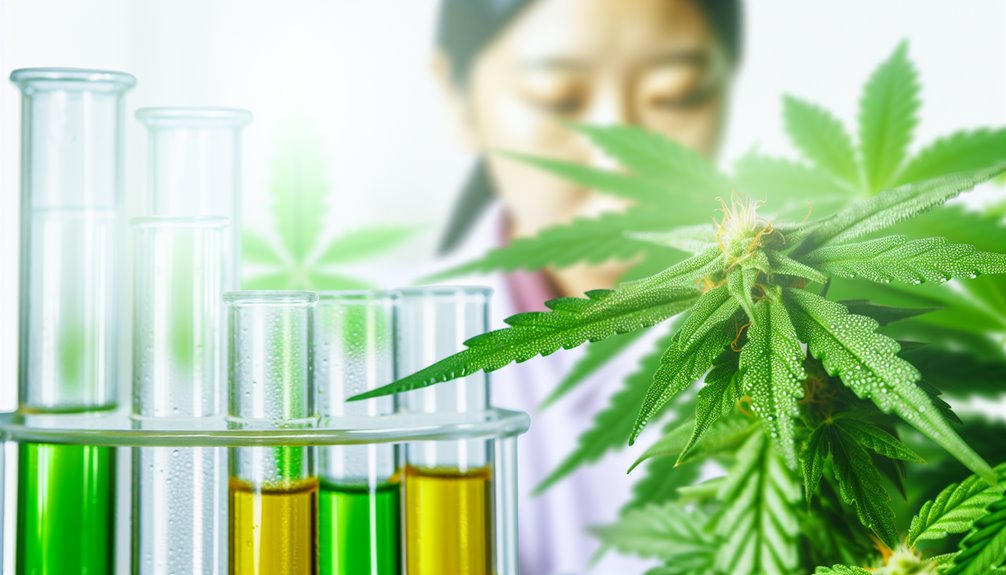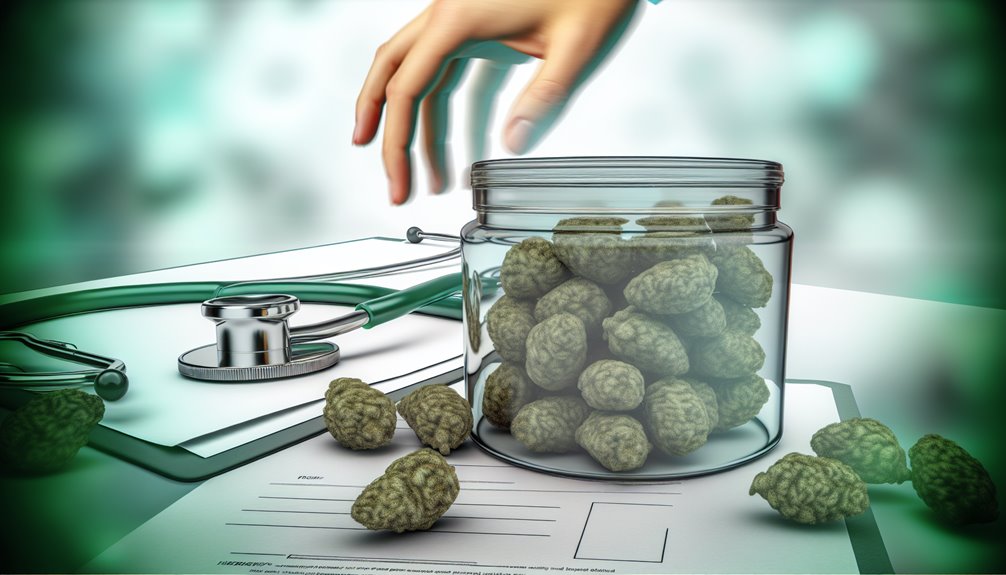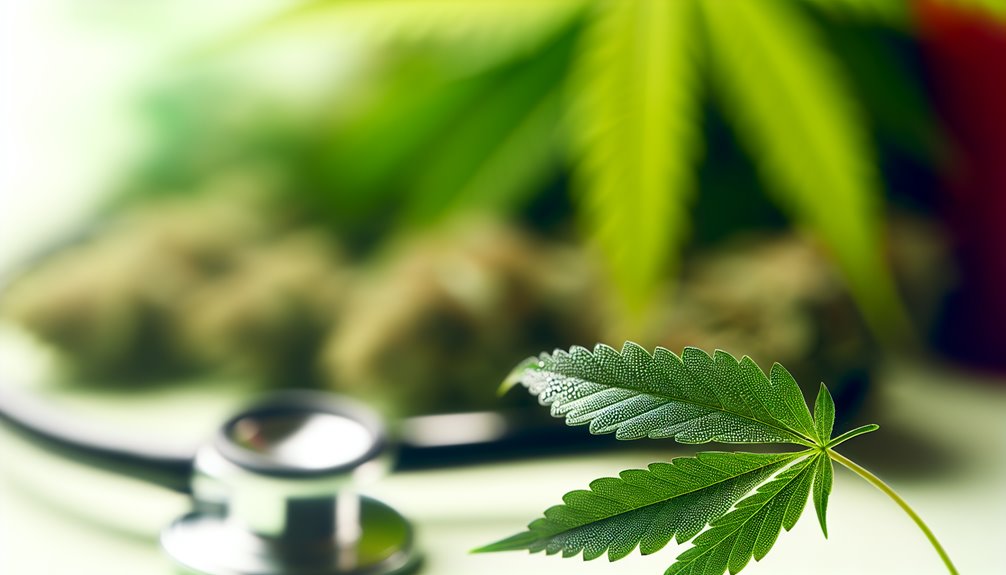You've likely heard about the growing acceptance of medical marijuana and its potential therapeutic benefits. With over 36,000 peer-reviewed studies, the field is rapidly evolving, offering new hope for patients and alternatives to traditional treatments. From breakthroughs in pain management to innovations like smokeless inhalers, the world of medical marijuana is expanding. Let's explore the latest research, debunk common myths, and hear from patients themselves. Ready to commence on this journey?
The Evolution of Medical Marijuana Legislation

As we explore the evolution of medical marijuana legislation, it is crucial to highlight the initial steps towards decriminalization. In the historical context, Massachusetts was the pioneer in 1911, requiring a prescription for Indian hemp sales. The Marihuana Tax Act of 1937 was a significant legislative milestone, federally prohibiting cannabis. Fast forward to 1973, Oregon led the way in decriminalizing cannabis. 1978 and 1979 saw New Mexico and Virginia recognizing the medical value of marijuana, respectively. The legislative milestones continued with California legalizing medical cannabis in 1996, followed by Hawaii, Nevada, and Colorado. Each of these steps paves the way for a more inclusive and understanding approach to medical marijuana, setting the stage for future advancements. In 2012, a major leap forward was made when Washington and Colorado became the first states to legalize cannabis for recreational use.
Latest Research Findings on Medical Marijuana
While the world of medical marijuana research is constantly evolving, it's clear that significant strides have been made in recent years. The recent advancements have expanded our understanding of its clinical applications. It's being used for pain control, managing autoimmune and neurological disorders, and even shows anti-cancer activities. Your desire to serve others should be informed by studies that show patients report improvements in health-related quality of life, often sustained over time. Yet, it's essential to be aware of the adverse events reported. Medical marijuana has shown potential as an alternative to opioids, helping manage multiple conditions. However, acquiring a medical marijuana card could lead to higher incidence and severity of cannabis use disorder. With over 36,000 peer-reviewed papers and 20,000 published in the last decade, the scientific opinion on cannabis is shifting, and the Schedule I classification seems increasingly outdated. Stay informed, serve responsibly.
Promising Breakthroughs in Cannabis-Based Therapies

Certainly, the domain of cannabis-based therapies has seen significant breakthroughs in recent years. The AEFO117 trial, a Phase 2a clinical trial, has shown promising advancements in treating Cannabis Use Disorder. This drug inhibits the CB1 receptor, reducing the effects of cannabis in daily smokers.
Noteworthy outcomes include:
- A 38% reduction in self-reported ratings of cannabis-related positive mood effects
- A decrease in cannabis use without precipitating withdrawal
- The drug's safety and efficacy in reducing both the positive mood effects and the decision to use cannabis
Moreover, research at Yale has identified cannabinoids as potential treatments for chronic pain. These cannabinoid therapies, like CBD and CBG, reduce pain signaling, offering a safer alternative to traditional treatments, thereby serving an essential need in global health.
Debunking Common Myths About Medical Marijuana
Despite what you may have heard or read, medical marijuana isn't merely for recreational use, nor is it highly addictive or without a scientific basis. Medical misconceptions often overlook the therapeutic benefits this unique plant offers. Strains are carefully bred to maximize medicinal value, reducing psychoactive effects. Addiction risks are considerably lower with medical strains, especially those high in CBD. Far from being a baseless remedy, numerous studies and historical usage attest to marijuana's medicinal potential. Negative effects vary based on strain type and individual predispositions, and with proper medical supervision, can be effectively managed. So, let's debunk these myths and recognize medical marijuana for what it truly is: a valuable tool in our medicinal arsenal.
The Role of Medical Marijuana in Pain Management

Given the chronic pain that plagues many adults, medical marijuana can be a game-changer. It's scientifically confirmed that cannabinoids effectively reduce chronic pain severity and interference, enhancing the quality of life.
You'll find that medical marijuana offers:
- Remarkable pain relief, with substantial evidence supporting its use in adults suffering from chronic pain
- Efficacy in treating specific pain conditions, including neuropathic pain, multiple sclerosis, and fibromyalgia
- Comparative safety and efficacy to traditional pain relievers, presenting a safer alternative with no risk of overdose
Through careful and responsible use, you can leverage the cannabinoid efficacy of medical marijuana in managing chronic pain, reducing the need for riskier medications. It's a worthy option, not only for pain control, but also for improving sleep and psychological distress.
Understanding the Different Strains of Medical Marijuana
When it comes to medical marijuana, understanding the different strains is essential. The tranquility and muscle-relaxation benefits of Indica strains make them suitable for nighttime use. Sativa strains, on the other hand, offer mood-lifting effects, ideal for daytime use. Hybrid strains, combining Indica and Sativa qualities, can be tailored to specific needs, broadening their medical applications. Your strain selection should be guided by specific symptoms, desired effects, and tolerance. Familiarize yourself with different cannabinoid profiles, as they greatly influence effects. Consumption methods also vary, affecting your experience. Finally, don't overlook terpene influences, as they contribute to therapeutic effects. Understanding these details empowers you to make informed choices, maximizing the benefits of medical marijuana.
The Potential Side Effects of Medical Marijuana

While exploring the distinct strains of medical marijuana offers an insight into its therapeutic potential, it's equally important to contemplate the possible side effects. Short-term ones include euphoria, altered senses, impaired memory and coordination, and an increased heart rate. Long-term use can lead to attention issues, lung problems, and an increased risk of heart disease, among others.
Here are some critical points to remember:
- Medical marijuana can interfere with learning and memory.
- It might lead to mental health issues like depression, anxiety, and mood disorders.
- There's an increased risk of injury for older adults due to impaired coordination.
Your patient safety is paramount, so it's essential to be aware of these side effects before beginning any medical marijuana regimen.
Patient Stories: Real-Life Experiences With Medical Marijuana
How can medical marijuana change lives? Patient testimonials reveal personal journeys of remarkable transformation. A 73-year-old woman with fibromyalgia experienced significant pain relief and improved well-being. A 53-year-old man quit prescription pain medications, including opiates, after starting medical marijuana. Another patient with epilepsy and autism became seizure-free for two years, showing marked improvements in coordination and daily activity. Medical marijuana has also aided patients with multiple sclerosis in managing pain and inflammation without the sedating effects of other medications. Patients with PTSD have seen improved sleep and reduced anxiety. True to these stories, medical marijuana has the potential to bring about life-altering change, offering relief where traditional medications have fallen short.
Medical Marijuana and Mental Health: An Overview

Diving into the complexities of medical marijuana and mental health, it becomes clear that the effects are multifaceted. The therapeutic potential gets complicated. Sure, it's a promising tool for anxiety management, but the dosage guidelines are tricky. Lower doses can reduce anxiety, while higher ones might increase it. Regular use can lead to tolerance and rebound anxiety.
Understanding the cognitive effects and the links to substance use disorders is essential. Patient education is paramount here. Some evidence shows:
- Better cognitive performance in some patients with psychotic disorders
- Possible neuroprotective effects
- The risk of triggering psychotic conditions, especially in young adults
Moreover, regulatory challenges impact research. Without extensive studies, offering accurate advice can be tough. Yet, you're dedicated to helping others navigate these complexities.
The Future Outlook: Innovations in Medical Marijuana
As the landscape of medical marijuana continues to evolve, so too do the innovations in its application and research. Advanced studies are expanding the spectrum of its uses, with ongoing trials focused on cannabinoid innovations for pain relief and nausea control. Your role as medical professionals is transforming, shifting towards patient-centered approaches that combine medical cannabis with other therapies. Technology is enhancing patient experiences, with new delivery methods like smokeless inhalers being tested for effectiveness. Despite current regulatory barriers, the Cannabis Research Bill is encouraging more research, uncovering how cannabinoids affect our bodies and their potential therapeutic applications. You're at the forefront of this evolution, working to provide thorough care and support for patients using medical marijuana.
Conclusion
As you journey through the ever-evolving landscape of medical marijuana, remember, it's not a one-size-fits-all remedy. It's a tool, like a Swiss army knife, with diverse applications for varied conditions. From pain management to mental health, the possibilities are expanding. But, it's essential to stay informed about potential side effects and legal aspects. So, keep exploring, keep questioning, and let's embrace the future of medical marijuana together.
If you're curious to learn more about how medical marijuana can benefit you, I warmly invite you to visit Fells Point Cannabis Docs of Maryland or give them a call at (410) 401-4200. The team there is knowledgeable and friendly, and they're ready to help you navigate your options. Don't hesitate to reach out—your journey toward wellness could be just a phone call away!
